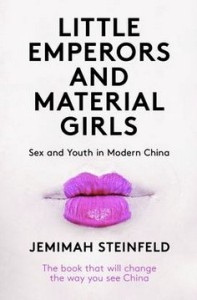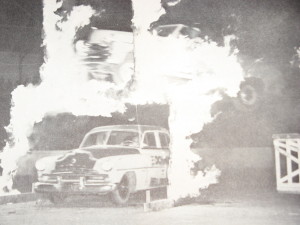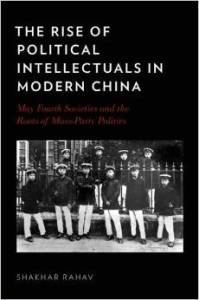Posted: March 17th, 2015 | 2 Comments »
1940 and hats are de rigueur in Shanghai. The La Union Hat Company probably had what you needed in terms of head wear – Panamas and Borsalinos as well as obviously some charming ladies bonnets. They were down on the Nanking Road (Nanjing Road). The Borsalino and scarf would have given you a very chic Jean Gabin as Pepe Le Moko look strolling the Bund….and you can’t get cooler than that!


Posted: March 16th, 2015 | No Comments »
RASÂ LECTUREÂ Â
Tuesday 17 March 2015
7:00 PM for 7:15 PM start
Radisson Blu Plaza Xingguo Hotel, Tavern Bar
78 XingGuo Road, Shanghai

Jemimah Steinfeld
on her new book:
 Little Emperors and Material Girls:
Sex and Youth in Modern China
China is the world’s fastest-growing economic powerhouse. Everybody knows this. But behind the headlines a once-in-a-generation sexual and cultural revolution is taking place – all in the bars, cafes and streets of China’s growing mega-cities. Welcome to this new China.
Writer and journalist Jemimah Steinfeld meets the young people behind the world’s fastest-moving nation to unveil their attitudes towards love, life and sexuality. Young Chinese have new words to describe the world they live in: ‘little emperors’ – single men who have grown up under the one child policy – they’re bossy and selfish; ‘bare branches’ – those without children; ‘leftovers’ – women over twenty-six who aren’t married; ‘comrade’ – how the gay community identifies itself; ‘love markets’ – weekend gatherings across China where parents attempt to find husbands and wives for their children, and others show up to match-make young singles and even offer boyfriends for hire.
Jemimah Steinfeld introduces the people at the heart of this world, from the woman starting China’s first online dating agency to the mistresses of the rich and powerful; from the company trying to sell sex toys to China’s middle-classes to the sino-punks of Beijing’s bar scene. Little Emperors and Material Girls is the book which will change the way you see China.
Talk Cost: RMB 70.00 (RAS members) and RMB 100.00 (non-members). Includes glass of wine or soft drink. Those unable to make the donation but wishing to attend may contact us for exemption.
Membership applications and membership renewals will be available at this event. Those unable to make the donation but wishing to attend may contact us for exemption.
RAS Monographs: Series 1 & 2 will be available for sale at this event. RMB 100 each (cash sale only).
To RSVP:Â Â bookings@royalasiaticsociety.org.cn
Posted: March 15th, 2015 | No Comments »
Perhaps this is where Shanghai’s atrocious driving began? In 1937 Barney Oldfield’s American Hell Drivers brought their show to Shanghai. It was May 27th and the Second Better Homes Exhibition was being held on the Race Club track up on Bubbling Well Road. It didn’t go particularly well – one of the drivers, Dick Acton, hit an incline at 40mph, swerved into the side of the course and killed seven foreigners watching the show including Shanghailanders who worked for the China Motors company and the Heinzering car dealership ironically. Still they were a big show and loads of people turned out to see them, including a young JG Ballard and his father. The Hell Drivers were part of the Chrysler Corporation (or at least Chrysler hired them to show off their cars), who got sued in the U.S. Court for China in Shanghai and compensation was paid to the families of the dead and injured. The Hell Drivers were on a Far East tour and got down as far as Australia in 1937 and performed before 30,000 people in Melbourne. The point of the whole thing was to dramatically demonstrate the strength of Chrysler’s new all-steel bodywork.
 The Hell Drivers in action
The Hell Drivers in action
Posted: March 14th, 2015 | No Comments »
I mentioned a while ago the various celebrations of the 90th anniversary of Lao She’s arrival in London to teach Mandarin at the School of Oriental Studies (SOS). The SOS was the forerunner of today’s School of Oriental and African Studies (SOAS) now part of the University of London and much expanded. Lao She however taught at SOS, which had been founded in 1916 at 2 Finsbury Circus, close by Liverpool Street Station, in what had been the building of the London Institution. It’s creation was originally a rather imperialistic project to better equip Britain to run its empire and also to compete with similar institutions in Paris, Berlin and St Petersburg. It remained at the SOS until 1938 when “African” was added. There’s more on Lao She’s time at SOS in the book Lao She in London…and here are some pictures of the old building (which still remains on Finsbury Circus and is now offices).

2 Finsbury Circus while still the London Institution

Upper picture is of SOS on Finsbury Circus, lower picture is the UCL building

The SOS building looking across the gardens at Finsbury Circus – the gardens still exist though are mostly a building site at the moment due to the Crossrail construction programme

An earlier shot of the building

Students reading Chinese in the old SOS library
Posted: March 13th, 2015 | No Comments »
As long as this blog’s been going I’ve been occasionally posting on the long term destruction around the faux-old Xintiandi development in Shanghai. Anyone evenly fairly conversant with the way things work in Shanghai will know that eventually nothing in that area will survive and it’s been going down at a rate of knots for nearly two decades now. It’s a tragedy; it’s civic vandalism; it’s a city stripping itself of its heritage down to every last brick. Still, the awfulness of the destruction of Lane 185 Jinan Road No.2 off Fuxing Road (that’s formerly Rue Bluntschli and Rue Lafayette in the old French Concession) is heart rending. Sue Anne Tay, of the excellent Shanghai Street Stories blog, has published some great photographs of the lane before it meets the bulldozers imminently….
As she notes:
This is it people, those who have not had a chance to admire the few gems in Lane 185 Jinan Lu No 2 (济å—è·¯185弄20å·) off Fuxing Lu (å¤å…´è·¯), south of Xintiandi, go while they are tearing it down. The first house, now taken over by the demolition office, has intricate wooden panels, ceilings and beams reflecting the Eight Immortals (å…«ä»™), bats and peaches. Down the lane is the elaborate and grand shikumen entrance House of Yi (yi is ease of pleasure) (逸åº). Lovely shikumen with hanging stone pavilions, elaborate motifs etc.





Posted: March 12th, 2015 | No Comments »
I’m putting this letterhead up for the Shanghai-based Russian Daily News because I know nothing about it and can find no references to it at all. So maybe someone else knows something. Here’s what I do know, and it’s paltry:
- The Shanghai Municipal Police kept the letterhead on file as a publication to be monitored;
- This letterhead was in use and included in the SMP files in 1940;
- The address, as you can see, was Avenue Foch in Frenchtown – now Yan’an Road.
And that’s it!

Posted: March 12th, 2015 | No Comments »
A special event this Thursday evening at SOAS to celebrate the 90th anniversary of Lao She’s arrival in London in 1924 to teach Mandarin at SOAS – where his students included a young China-obsessed Graham Greene!! (see my post on that here)

Posted: March 11th, 2015 | No Comments »
Shakhar Rahav’s The Rise of Political Intellectuals in Modern China concentrates not on Shanghai and Peking but on Wuhan around the May 4th Movement…..

- Histories of China’s May Fourth movement have focused on the seaboard metropoles of Beijing and Shanghai. This book is the first in English to look at the movement from the hinterland city of Wuhan. It thus highlights the ways in which hinterland activism helped shape the movement.
- Rather than focusing on ideology or organization, the book explains the movement’s success in terms of social relations and social networks.
- Previous studies of the period have acknowledged the importance of myriad small societies in the political changes that presaged the Chinese Communist party. Studying the development and everyday conduct of such societies, the book illuminates what they meant for their members at the time.
- Studies of the movement have emphasized its importance for the rise of Communism. This study attempts to explain the transition from politics conducted through a web of small societies, to a politics conducted by means of mass-oriented political parties.
- May Fourth is usually taught by referring to a handful of historical personages who operated in Beijing. This book offers a narrative account that occurs in major hinterland city-Wuhan-and it circles around a unique protagonist-Yun Daiying-whose career intersected with that of well known figures who later acquired much significance, such as Mao Zedong. The book thus illuminates the period and better known activists, like Mao, from a fresh and unexpected angle.
















